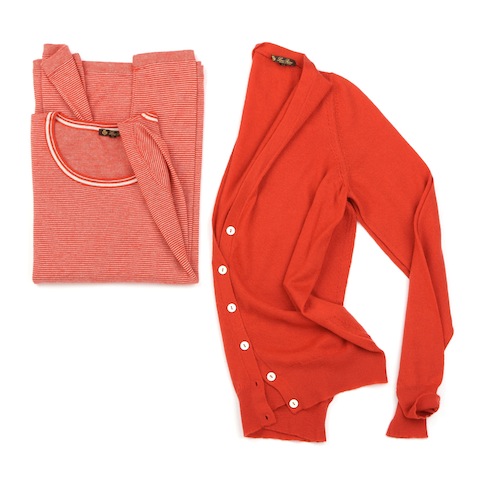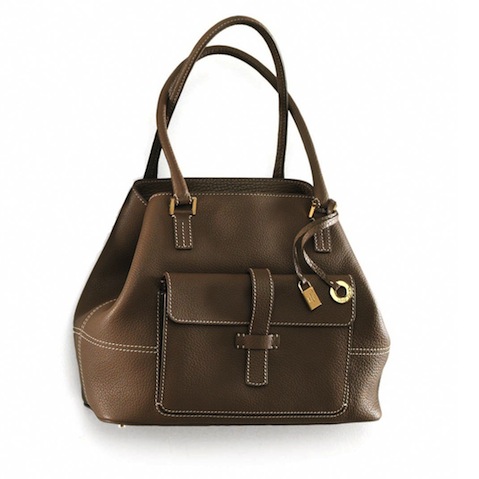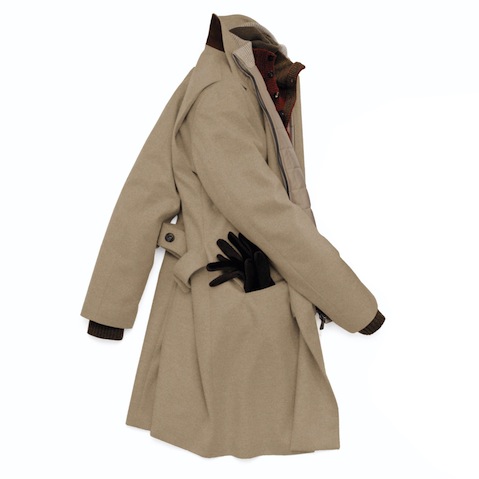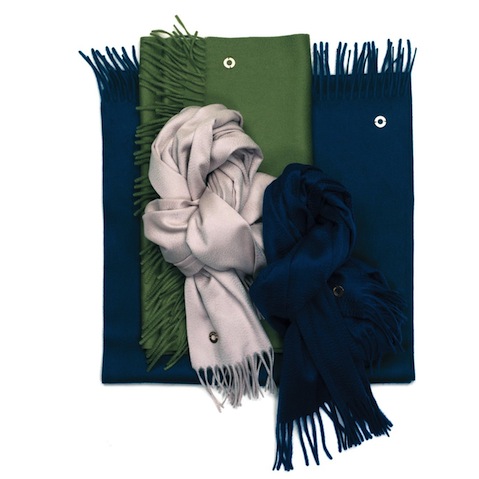Loro Piana: Ultimate luxury

Photo: Courtesy of Loro Piana
How involved are you in the design process of a collection? Obviously, you have the final word in everything, but up to which level do you roll up your sleeves and get work done?
Many of the items available at our stores were at first conceived to answer the specific needs of a customer (or group thereof), friend, or even our own. Think about the Horsey, a technical garment especially designed for the Italian riders at the 1992 Olympic Games in Barcelona, also approved by the FISE (Italian Federation of Equestrian Sports). Every detail has been considered to satisfy the specific needs of a rider. Or the Icer, originally designed for winter sports and chosen by the Rossignol Racing Team for the 2000 Alpine Skiing World Cup. Barrage was instead expressly designed for the riders of the Italian team at the 2004 Olympic Games in Athens. Although such iconic pieces were developed in collaboration with Loro Piana sports teams, or in order to respond to the specific requirements of outdoor sports, their versatility has made them exceptional all-purpose garments for the city, leisure and travel. All Loro Piana products are created on the basis of the search for authentic quality, and translate our values into fabrics and garments that reflect a profound knowledge of the final customer and his/her lifestyle.
Please describe a typical day in your lives.
That is a difficult question. If we are not traveling the world (Peru for Vicuña, Australia and New Zealand for merinos, Mongolia for cashmere and baby cashmere) in search of the best raw materials, or visiting one of our subsidiaries all over the world, usual working hours are mainly spent in our offices in Milan, as well as at the HQs. Our leisure time is instead 100% devoted to our families and friends, and to the outdoor sports. (Sergio Loro Piana was a rider and now loves cruising on his boat, “Out of The Blue”, as well as driving helicopters; Pier Luigi Loro Piana likes skiing. He also owns a boat, “My Song”, which competes in many regattas around the world, while also serves as the family sailing boat).

Do you ever feel the need for Loro Piana to get more 'modern' or 'fashionable'?
For six generations, we have been working with the best raw materials available on Earth. We are always trying to find new ways to get the utmost quality and timeless elegance for fabrics and garments that can last more than a lifetime. Therefore, we see no reason to enter the fashion arena, as we have never followed trends and fads, and hopefully we never will. Our customers themselves are much more sensitive to quality and good taste rather than fashion. Modernity, on the other hand, is expressed in the continual efforts of our R&D as well as in the constantly updated answers to our customers’ needs.
Would you be open to one-off collaborations with designers for a specific project?
Our brand is very peculiar, as you can imagine, as it has built its reputation over decades of searching for the best raw materials and on the refusal to compromise on quality in all its aspects (materials, processes, aesthetics). That is why we are not planning on doing co-branding, or working with designers (ours is a team of sixty people, all of them focused on answering the needs of our customers).
What is your business motto?
Respect the past while always improving…

How do you make decisions? Is there a certain way in which you distribute the company's responsibilities among you and your brother?
As brothers leading the same company, we have a long term vision as well as a common strategy, in which we both work as co-CEOs, resulting in our day-by-day mutual commitment to operational tasks. Family and brotherhood are among our strongest principles. At the same time, we decided to alternate Chairmanship (the legal representation of the company) every three years, in order to formally communicate our relevance and our potentially interchangeable role at the helm of the company.
As entrepreneurs dealing with luxury, do you see the world economy recovering soon? What are your predictions? Which markets do you see as more promising?
The financial crisis, like all cycles, is bound to come to an end and I believe that it is already in sight. In fact, according to the latest marketing and financial analysis of luxury consumers' purchasing and spending, the affluent consumer market is beginning to emerge from the recession. Of course things have changed substantially in the meantime. During the recession, the affluent consumers took time off from shopping to reassess their priorities and re-evaluate their spending. This process has resulted in changes in the manner in which they shop and what they value in the luxury brands they purchase. To us, the more promising markets are still those where luxury (meaning quality) are well received and understood, i.e. Europe, the U.S. and Japan. However, promising countries are at the same time the typical emerging ones forming the BRIC. Whenever we see that we have an interesting customer basis, and the right location becomes available, we open a store (we have stores in Russia, UAE, Ukraine, Turkey, Qatar, Kuwait, and China of course). We also want to keep our brand exclusive. Our idea is not to plaster the world with our stores: new doors are the result of a careful planning.

Who would you say is the Loro Piana man or woman? What sort of person makes up your customer base?
They are high profile men and women who are sensitive to elegance and quality and not easily influenced by fashion trends. Therefore, they are constantly searching for timeless quality. They travel very often and have a very active life, requesting reliable and functional products.
These days in Europe 'value for money' is becoming quite a big issue. How can someone manage this in terms of fashion? Are quality clothes an investment?
Consumers are more careful about unnecessary excessive spending, therefore willing to spend only for those products that keep their promise of quality (and respect for nature). Their attitude will move from showing off to the more discreet and low profile. We will therefore stick to our values and pursuit of the best, looking for quality and durability. Surveys prove that post-recession luxury consumers will now expect the luxury brands they patronise to deliver on even higher expectations of quality than before, with an adamant demand that the value of their purchase will be in line with the price. In one word, quality clothes that last through time are for sure an investment.
What is the best business advice you have been given?
Our father was the greatest supporter of quality: he taught us the meaning of looking for the best.
How do you feel about companies such as J.Crew that offer cashmere products at lower prices? What are the differences between theirs and a high-end product like yours?
As for wines, there is cashmere and cashmere; looking for the best (and very often the scarcest) means selecting the rarest and finest fleece directly from the country of origin, thanks to a time-honoured relationship with the local players. I will use a metaphor: our cashmere is the Chateau d’Yquem of the Sauternes, i.e. the best of the best in terms of quality at all levels. You must remember that Loro Piana as a company is very vertical: from hands-on access to raw materials, to the whole structure of DOS worldwide, and the after-sale personalised service. We can control every step of the value chain. Thanks to the most updated technologies, our fibres are carefully and extensively controlled to reach the highest levels of fineness and quality (fibres are magnified up to 34,000 times in order to ensure purity and proper standards of thickness, fineness and length; some 450 readings are taken for every batch and only if a batch passes inspection will it go on for further checks). Our luxury goods are 100% made in Italy, which means they are carefully crafted and meticulously checked at all levels by expert hands and eyes in our Italian mills.

You are considered pioneers in luxurious fabrics. Which products and fabrics make you most proud?
At present, Loro Piana Baby Cashmere for sure. It comes from the very first and totally harmless combing of the Hyrcus goat kids, taking place when the animals are between three and twelve months old. After years of gentle persuasion, we have finally managed to convince the nomadic Chinese and Mongolian suppliers of “adult cashmere” to separate the extremely fine fibres gathered from this first combing, in order to obtain the unmatchable hand which comes out of this unique under-fleece. Limited by definition, Loro Piana Baby Cashmere matches our company’s exceptional standards; fine, soft and obtained from a special process, it is a discreet and never obvious fibre.
You contributed to saving the vicuña population in Peru and you also managed to set a fine example in conserving a fragile ecosystem by collaborating with the Peruvian government. Please tell us a little bit more about this project. How did you initiate it and are you happy with the results so far?
Vicuña, the most precious and finest natural fibre, is a treasured project at Loro Piana. The precious animal was under the risk of extinction (and protected by the endangered species code CITES) when we got involved in its reintroduction on the world market with an agreement with the Peruvian government. In 2008 Loro Piana acquired a property of more than 2,000 hectares to be converted into a private reserve. It is still a start-up project, a challenging one, but we are very proud of it.We can also say we are happy about this decision so far, even if it is a bit too early to make previsions.

How worried are you regarding natural resources? Do you believe that fashion companies can and should play a role in preserving raw materials?
We are investing in research and development of alternative solutions that respect the environment and our heritage. Using the natural resources sensibly and giving promises that you can keep to your customers is vital. The primary responsibility for the luxury market, considering the current environment, is to deliver through the brand experience that our demanding (and ethical) consumers expect, so definitely yes, companies play a great role in this process.
Is there such a thing as an ethical/sustainable consumerism?
For sure there is. The new disciplines are a greater awareness for the environment and spending with sense, investing in products that fulfil a promise of quality and durability, that are sustainable and here to last. As people become more calculating and careful with their spending, luxury is defined as what it does for them personally across a wide range of benefits that remain. Consumers will be more careful about unnecessary and excessive spending, and more aware of the environment.
You are travelling constantly. Which is, for you, the best hotel and best restaurant in the world? What has been the best gourmet experience you have lived so far?
It would not be fair to name just one (honestly, the Capri Palace in Anacapri, Naples is among our top ten; the Plaza Athénée in Paris is a second home, same for the Claridge's in London). Each and every trip potentially hides the best gourmet experience, be it in a 3-star Michelin restaurant or in a gheer tent in Mongolia. It all depends on your ability to face different cultures with inner curiosity.
Which city has a special place in your hearts? Why?
The perfect city does not exist. We love many for different reasons: Paris, NYC and, of course, Rome and Milan. We also adore Greece and its remote islands, as we know its landscapes as passionate sailors. We love to travel; we are always on the move (but we also like to get back home to Borgosesia to our families).
How do you define luxury?
True quality without compromise.
What are your plans for the future? How do you see the company expanding?
We will keep serving the most sophisticated and demanding customers worldwide and fulfil their desire of a refined product by sticking to our mission of uncompromising quality and exclusive luxury-wear. While consolidating the leadership in the premium textile industry, we will also complete the development of our product range and our retail structure in order to grow closer to such customers all over the world.
Many thanks to Carola Dolci for her help with this interview.



